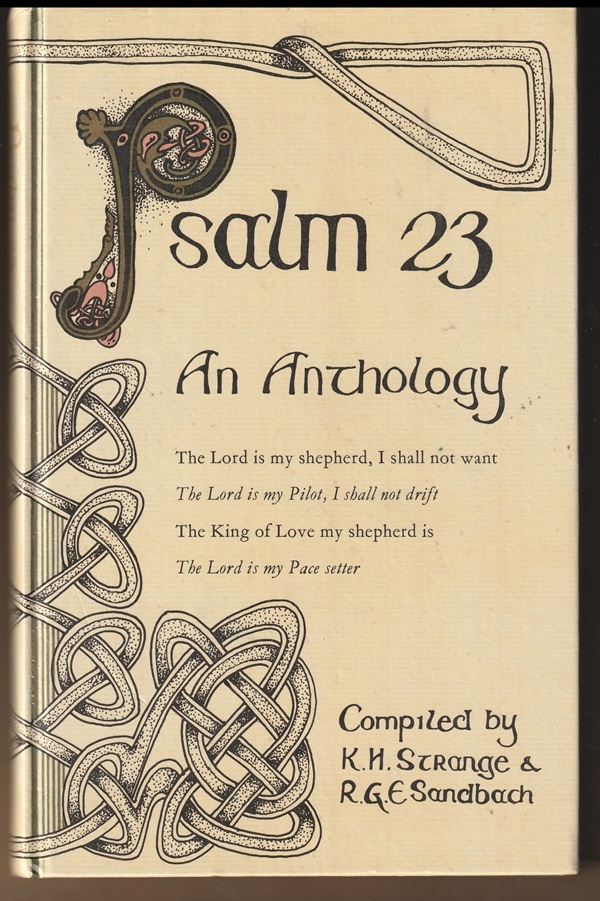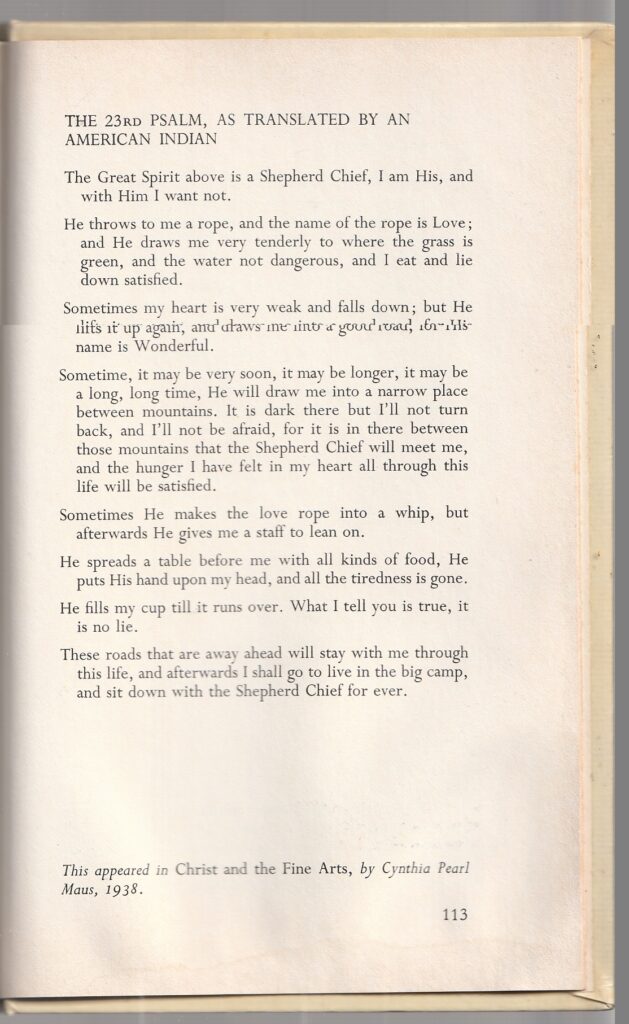On the one hand, it’s amazing that, for hundreds of years, people have been rewriting Psalm 23. You know, the one that begins:
The Lord is my shepherd; I shall not want.
He maketh me to lie down in green pastures:
he leadeth me beside the still waters.
He restoreth my soul:
he leadeth me in the paths of righteousness for his name’s sake.
That’s the first three verses of the six-verse psalm as it appeared in the Authorized Version of the Bible, published in 1611, better known as the King James Version. The other verses are these:
Yea, though I walk through the valley of the shadow of death,
I will fear no evil:
for thou art with me; thy rod and thy staff they comfort me.
Thou preparest a table before me in the presence of mine enemies:
thou anointest my head with oil; my cup runneth over.
Surely goodness and mercy shall follow me all the days of my life:
and I will dwell in the house of the Lord for ever.
When it comes to great literary works in English, the King James Version has a hallowed spot, and its Psalm 23 is recognized as just about perfect. Granted, all those -eth verbs and thou-thying can make it sound a bit antique, but those are easily fixed without messing with the core words: “You anoint my head with oil; my cup runs over.”
Showing respect
 On the other hand, it’s also easy to understand why so many people want to create their own version.
On the other hand, it’s also easy to understand why so many people want to create their own version.
Psalm 23 in the King James Version is such a beautiful prayer that it has touched generations of believers and non-believers alike. One way to show respect for the psalm is to seek to emulate it.
That seems to be the inspiration for most of the 87 versions of the psalm that are in Psalm 23: An Anthology by K.H. Strange and R. G. E. Sandbach, published in 1978. (Of those, there are 60 English versions and 27 versions in various dialects and pidgin.)
A few versions are the result of scholarly efforts to translate the whole of scripture, such as the Jerusalem Bible, originally published in French in 1950. Actually, there are two translations of the psalm from two versions of that bible. They begin:
Yahweh is my shepherd,
I lack nothing.
and
The Lord himself is my shepherd,
What more could anyone ask!
Paraphrasing and editorializing
Many of the versions in the Strange-Sandbach anthology are paraphrases to one extent or another. For example, the Living Bible (1971) paraphrase starts:
Because the Lord is my shepherd, I have everything I need!
Others rewrite the psalm into a hymn, such as this 1912 version by Stopford Brooke:
Beside still waters, where the grass
Is sweet and soft, by shadowy trees,
My Shepherd leads my weary feet
To give me ease.
Often such writers move around words or phrases in order to fit their melody. However, the version in the St. Olave’s Humnary (1898) goes a step further by, basically, editorializing — making clear to the listener and the singer that as rosy as the psalm may seem, life isn’t so free of anxieties:
In pastures green? Not always; sometimes He
Who knoweth best, in kindness leads me
In weary ways, where heavy shadows be.
For John Wesley’s Methodist hymn book of 1779, his brother Charles provided a version that took the Old Testament psalm and sent it forward into the future, into the New Testament:
Jesus the good shepherd is;
Jesus died the sheep to save.
“Grassy folds” and “a glen of gloom”
With so many versions in one book, it’s possible to track the wide variation in the way certain phrases or images are translated.
Consider the “green pastures” of the King James Version psalm. Here are some variations:
- “pastures of tender grass”
- “pasture full of grass”
- “grassy folds”
- “folds of budding-grass”
- “heavenly pasture”
- “springing Grass”
- “where green herbs grow”
- “oasis of green”
And here are some variations on “the valley of the shadow of death”:
- “at death’s door”
- “in the midst of the shadow of death”
- “in the dim & dusky valley”
- “in death’s shady black abode”
- “in death’s dark vale”
- “the gloomy vale of death”
- “through Death’s dark valley and shade”
- “through the valley of dread”
- “through a glen of gloom”
- “the darkness of death”
- “in the dark ravine”
“New life to my soul”
Individual readers of Psalm 23: An Anthology are likely to find their own favorites among the dozens that Strange and Sandbach provide.
One of mine is the version from The New Testament in Basic English (1941). Basic English was developed in the early twentieth century as an easy-to-learn international language, based on standard English but with a greatly simplified vocabulary (850 core words) and grammar. Here is how the Basic English version starts:
The Lord takes care of me as his sheep; I will not be without any good thing. He makes a resting-place for me in the green fields: he is my guide by the quiet waters. He gives new life to my soul: he is my guide in the ways of righteousness because of his name.
In Basic English, there are no synonyms allowed. That seems to result in a translation that feels somewhat tight, constrained. Nonetheless, there is a simple nobility that the words convey.
“I am His”
 Several versions in Psalm 23: An Anthology reinterpret the Shepherd of the prayer as a Teacher, a Pilot, a Probation Officer and even a Space Controller.
Several versions in Psalm 23: An Anthology reinterpret the Shepherd of the prayer as a Teacher, a Pilot, a Probation Officer and even a Space Controller.
That’s what’s happening in the version I find most interesting. It’s from Christ and the Fine Arts by Cynthia Pearl Maus (1938), and it’s titled, without any further elaboration, “The 23rd Psalm, As Translated by an American Indian.” It begins this way:
The Great Spirit above is a Shepherd Chief, I am His, and with Him I want not.
He throws to me a rope, and the name of the rope is Love; and he draws me very tenderly to where the grass is green, and the water not dangerous, and I eat and lie down satisfied.
Sometimes, my heart is very weak and falls down; but He lifts it up again, and draws me into a good road, for His name is Wonderful.
There is much here of sacred resonance. For instance, “I am His” echoes the words of the Song of Songs 6:3: “I am my beloved’s, and my beloved is mine.” Similarly, the phrase “His name is Wonderful” brings to mind the words of Handel’s Messiah from Isaiah 9:5: “For unto us a Child is born, unto us a Son is given, and the government shall be upon His shoulder; and His name shall be called Wonderful Counsellor, the Mighty God, the Everlasting Father, the Prince of Peace.”
“A narrow place between mountains”
This version speaks of the future and eventual death:
He will draw me into a narrow place between mountains. It is dark there but I’ll not turn back, and I’ll not be afraid, for it is in there between those mountains that the Shepherd Chief will meet me, and the hunger I have felt in my heart all through this life will be satisfied.
Near the end, the speaker says, “What I tell you is true, it is no lie.”
Among all the many versions in this Strange-Sandbach collection, I find this version — this reinterpretation, this elaboration — the richest and most deeply spiritual.
The reference to “a narrow place between mountains” is a visceral image of what it feels like to be nearing the end of life.
The same is true with the mention of “the hunger I have felt in my heart all through this life.” Such a telling way to describe how, for any human being, life is never fully satisfying.
Psalm 23: An Anthology is a rich collection, and this version is among its richest treasures.
Patrick T. Reardon
2.20.25
Written by : Patrick T. Reardon
For more than three decades Patrick T. Reardon was an urban affairs writer, a feature writer, a columnist, and an editor for the Chicago Tribune. In 2000 he was one of a team of 50 staff members who won a Pulitzer Prize for explanatory reporting. Now a freelance writer and poet, he has contributed chapters to several books and is the author of Faith Stripped to Its Essence. His website is https://patricktreardon.com/.

Praise God! This was in my feed! What an incredible read! Opening the eyes of my heart Lord! Looking at the verses their differences with the use of words, the language expressed and preserving the original meaning is exhilarating! with the same sentiment-This is great for those of us who like devotional in/depth method centered or focused on studying scriptures., using various methods. Thank you so very much, I would love to get myself a copy of this book!
The book is available here: https://www.amazon.com/gp/product/0715203746/ref=ppx_yo_dt_b_asin_title_o00_s00?ie=UTF8&psc=1
Yes, I bought it immediately, appreciate the quick response. Take care and God Bless.